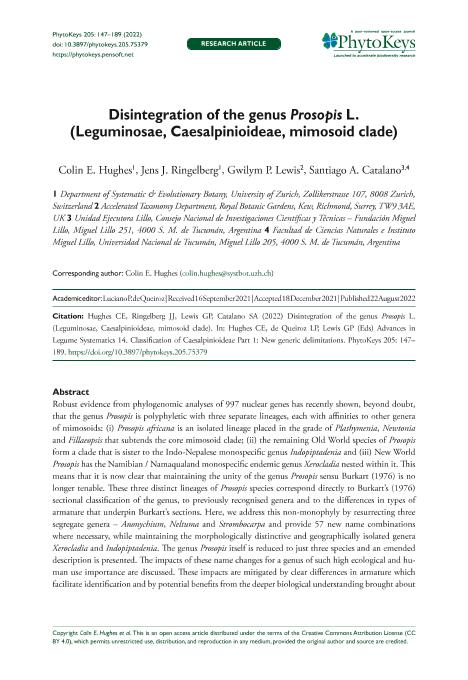Mostrar el registro sencillo del ítem
dc.contributor.author
Hughes, Colin E.
dc.contributor.author
Ringelberg, Jens J.
dc.contributor.author
Lewis, Gwilym P.
dc.contributor.author
Catalano, Santiago Andres

dc.date.available
2023-09-12T14:09:55Z
dc.date.issued
2022-08
dc.identifier.citation
Hughes, Colin E.; Ringelberg, Jens J.; Lewis, Gwilym P.; Catalano, Santiago Andres; Disintegration of the genus Prosopis L. (Leguminosae, Caesalpinioideae, mimosoid clade); Pensoft Publishers; PhytoKeys; 205; 8-2022; 147-189
dc.identifier.issn
1314-2003
dc.identifier.uri
http://hdl.handle.net/11336/211252
dc.description.abstract
Robust evidence from phylogenomic analyses of 997 nuclear genes has recently shown, beyond doubt, that the genus Prosopis is polyphyletic with three separate lineages, each with affinities to other genera of mimosoids: (i) Prosopis africana is an isolated lineage placed in the grade of Plathymenia, Newtonia and Fillaeopsis that subtends the core mimosoid clade; (ii) the remaining Old World species of Prosopis form a clade that is sister to the Indo-Nepalese monospecific genus Indopiptadenia and (iii) New World Prosopis has the Namibian / Namaqualand monospecific endemic genus Xerocladia nested within it. This means that it is now clear that maintaining the unity of the genus Prosopis sensu Burkart (1976) is no longer tenable. These three distinct lineages of Prosopis species correspond directly to Burkart’s (1976) sectional classification of the genus, to previously recognised genera and to the differences in types of armature that underpin Burkart’s sections. Here, we address this non-monophyly by resurrecting three segregate genera – Anonychium, Neltuma and Strombocarpa and provide 57 new name combinations where necessary, while maintaining the morphologically distinctive and geographically isolated genera Xerocladia and Indopiptadenia. The genus Prosopis itself is reduced to just three species and an emended description is presented. The impacts of these name changes for a genus of such high ecological and human use importance are discussed. These impacts are mitigated by clear differences in armature which facilitate identification and by potential benefits from the deeper biological understanding brought about by recognition of these divergent lineages at generic rank. We provide an identification key to genera and present a map showing the distributions of the segregate genera, as well as drawings and photos illustrating variation in armature and fruits.
dc.format
application/pdf
dc.language.iso
eng
dc.publisher
Pensoft Publishers

dc.rights
info:eu-repo/semantics/openAccess
dc.rights.uri
https://creativecommons.org/licenses/by-nc-sa/2.5/ar/
dc.subject
ANONYCHIUM
dc.subject
FABACEAE
dc.subject
GENERIC DELIMITATION
dc.subject
INDOPIPTADENIA
dc.subject
MONOPHYLY
dc.subject
NELTUMA
dc.subject
STROMBOCARPA
dc.subject
TAXONOMY
dc.subject
XEROCLADIA
dc.subject.classification
Biología

dc.subject.classification
Ciencias Biológicas

dc.subject.classification
CIENCIAS NATURALES Y EXACTAS

dc.title
Disintegration of the genus Prosopis L. (Leguminosae, Caesalpinioideae, mimosoid clade)
dc.type
info:eu-repo/semantics/article
dc.type
info:ar-repo/semantics/artículo
dc.type
info:eu-repo/semantics/publishedVersion
dc.date.updated
2023-07-31T15:06:23Z
dc.journal.volume
205
dc.journal.pagination
147-189
dc.journal.pais
Bulgaria

dc.description.fil
Fil: Hughes, Colin E.. Universitat Zurich; Suiza
dc.description.fil
Fil: Ringelberg, Jens J.. Universitat Zurich; Suiza
dc.description.fil
Fil: Lewis, Gwilym P.. Royal Botanic Gardens; Reino Unido
dc.description.fil
Fil: Catalano, Santiago Andres. Consejo Nacional de Investigaciones Científicas y Técnicas. Centro Científico Tecnológico - Tucumán. Unidad Ejecutora Lillo; Argentina. Universidad Nacional de Tucumán. Facultad de Ciencias Naturales e Instituto Miguel Lillo; Argentina
dc.journal.title
PhytoKeys
dc.relation.alternativeid
info:eu-repo/semantics/altIdentifier/doi/http://dx.doi.org/10.3897/PHYTOKEYS.205.75379
dc.relation.alternativeid
info:eu-repo/semantics/altIdentifier/url/https://phytokeys.pensoft.net/article/75379/
Archivos asociados
